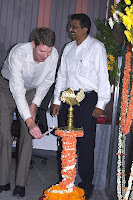Malcom Gladwell (author of
Blink and
Tipping Point) has a sharp eye to observe hidden patterns in everyday life. He has a gift of making mundane look exciting and new. So, I started reading his new book
Outliers: The Story of Success with a lot of scepticism. Its an easy, brilliant read, very typical of Gladwell. I'm glad I read it, though I didn't find anything that is actionable for practical application. So, do not expect any self-help types in this book. However, I still wanted to share a few central ideas from this book. Here we go:
The central premise of this book is that there is no self-made person and people don't rise from nothing and successful people indeed owe a lot to parentage and patronage. They are also beneficiaries of hidden advantages, extraordinary opportunities and cultural legacies that allow them to learn and work hard and make it big in a ways that others cannot. He lists the following things (beyond passion, talent and hardwork) that help people achieve extraordinary success:
1. Skewed age distribution at the time of selection, streaming and differentiation: At a very early age a few kids that are born closest to the cut-off date for some selection get a head start over others.
2. The 10,000 hour rule: Achievement is talent plus preparation. Upon the closer look at the succesful and gifted, innate talent seem to play a smaller role than preparation.
3. Intelligence has a threshold: Intellect and Achievement are far from perfectly corelated. A high IQ is not of much use, if you are surrounded by a handful of clever ones, you need other traits too, especially "practical intelligence".
4. Practical Intelligence: Knowing what to say to whom, knowing when to say it and knowing how to say it for maximum effect. Its practical in nature and helps you read situations correctly and get what you want. Critically, this kind of an intelligence, is different from the analytical ability measured by IQ.
5. Demography: Culture, Generation and family history can give the greatest of opportunities.
In the second part of the book, Gladwell questions whether the traditions and attitudes we inherit from our forebears can be used to analyse why people succeed and how to make people better by taking their cultural legacies seriously.
As a first example he talks about the role of PDI (Power-Distance Index) in analysing some chilling air crashes (This chapter in itself is a great read for anyone trying to improve bottoms-up communication in an organization). PDI is concerned with attitudes toward hierarchy, specifically with how much a particular culture values and respects hierarchy. With numerous examples (some case studies in avionics industry) on the communication between the first-office and pilot/ATC, Gladwell shows how the cultural background of someone having a high PDI affected crucial decisions, that could have averted several crashes.
Other cultural traits that play a major role in success/failure are 1. individual-collectivism scale (how much individuals expect to look after themselves) and 2. uncertainitly avoidance (how well does a culture tolerate ambiguity).
Its fairly clear that each of us comes from a culture with its own distinctive mix of strengths and weaknesses, tendencies and predispositions. Who we are cannot be separated from where we are.
Now comes the interesting fact. Gladwell shows that thoroughout history farmers who grow rice have always worked harder than almost any other kind of farmer. Its no wonder that China whoch grows a lot of rice, also has its people that are very comfortable in math. Gladwell argues that this fact has got nothing to do with intelligence, but because of doggedness that is needed to understand maths and that this trait comes directly because they are used to work harder - afterall they have been growing rice for ages.
In essence, Outliers says that the success follows a predictable course. Success is simply not the sum of decisions and efforts we make on our own behalf. It is, rather a gift. Outliers are those who have been given opportunities and who have had the strength and presence of mind to seize them.
Enjoy!!









